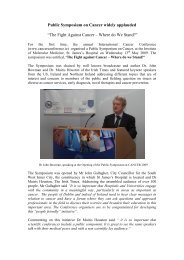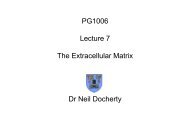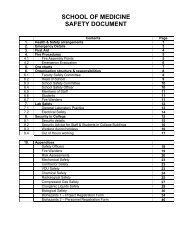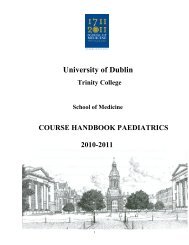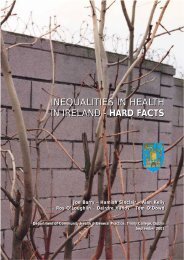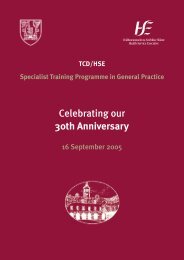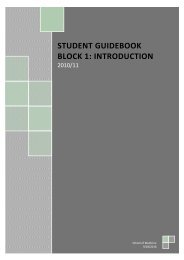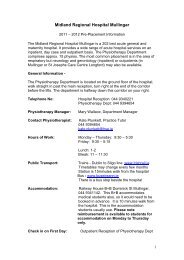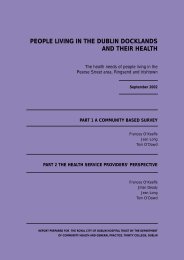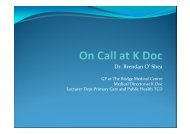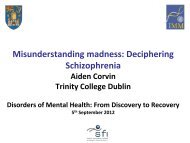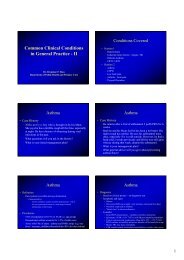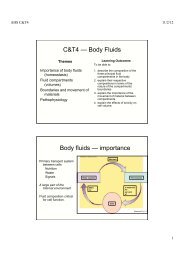year-2-study-guide-2.. - School of Medicine - Trinity College Dublin
year-2-study-guide-2.. - School of Medicine - Trinity College Dublin
year-2-study-guide-2.. - School of Medicine - Trinity College Dublin
You also want an ePaper? Increase the reach of your titles
YUMPU automatically turns print PDFs into web optimized ePapers that Google loves.
Medical proteomics (2 lectures)<br />
Lecturer: Dr. Henry Windle<br />
Summary <strong>of</strong> the topics covered:<br />
Introduction to medical proteomics. Proteomics in biomarker discovery. Applications<br />
<strong>of</strong> proteomics for improved medical diagnostics and drug development. Protein chips<br />
and arrays. Human proteome organisation.<br />
Molecular basis <strong>of</strong> psychiatric disorders (2 lectures)<br />
Lecturer: Dr. Derek Morris, Dr. Richard Anney<br />
Summary <strong>of</strong> the topics covered:<br />
Psychiatric diseases as complex genetic disorders. Mutations in DNA and molecular<br />
genetic <strong>of</strong> psychiatric disorders. Endophenotypes in the analysis <strong>of</strong> psychiatric<br />
diseases. Linkage and association studies.<br />
Molecular mechanisms in aetiology <strong>of</strong> ADHD. Applications <strong>of</strong> molecular genetics in<br />
diagnostics <strong>of</strong> psychiatric diseases. Mouse models <strong>of</strong> ADHD. Dopaminergic<br />
hypothesis in ADHD. Treatment approaches and their link to research in ADHD.<br />
Indicative Resources<br />
The cell: a molecular approach (Ge<strong>of</strong>frey M. Cooper)<br />
Developmental Biology (Gilbert S., 7th Edition, SinauerPress).<br />
Molecular cell biology (Harvey Lodish et al.)<br />
Molecular biology <strong>of</strong> the cell (Bruce Alberts et al.).<br />
Encyclopedia <strong>of</strong> molecular cell biology and molecular medicine (Robert A. Meyers)<br />
Molecular <strong>Medicine</strong> (R.J.Trent)<br />
Essentials <strong>of</strong> Human Embryology (Larsen)<br />
Introduction to Molecular <strong>Medicine</strong> (Ross, Dennis W.)<br />
An Introduction to Molecular <strong>Medicine</strong> and Gene Therapy (Thomas F. Kresina)<br />
Learning Outcomes<br />
The overall objective <strong>of</strong> this module is to empower the students with the knowledge<br />
<strong>of</strong> the essential aspects <strong>of</strong> molecular mechanisms <strong>of</strong> disease development<br />
accumulated over the recent <strong>year</strong>s and to enable the medics to apply this information<br />
in clinical environment for improved diagnostic and treatment <strong>of</strong> the patients.<br />
On successful completion <strong>of</strong> this module, the students will be able to:<br />
• Identify the molecular mechanisms involved in human development,<br />
developmental abnormalities, tissue damage, regeneration and recognise stem<br />
cell applications in this context;<br />
• Describe the fundamental molecular mechanisms <strong>of</strong> cell communications and key<br />
intracellular processes underlying inflammatory diseases and human host<br />
defence responses;<br />
• Explain the genetic and environmental factors involved in the development <strong>of</strong><br />
cancer and haematological malignancies and understand the key stages <strong>of</strong><br />
cancer development and progression;<br />
• Explain how structural and functional analysis <strong>of</strong> molecules can be applied to the<br />
generation <strong>of</strong> novel drugs and design <strong>of</strong> new therapies, including gene delivery<br />
and gene therapy;<br />
• Explain the molecular processes underlying common psychiatric disorders;<br />
• Discuss how contemporary molecular medicine technologies can be applied for<br />
the development <strong>of</strong> new diagnostic methods and molecular approaches for<br />
therapeutic intervention<br />
9




